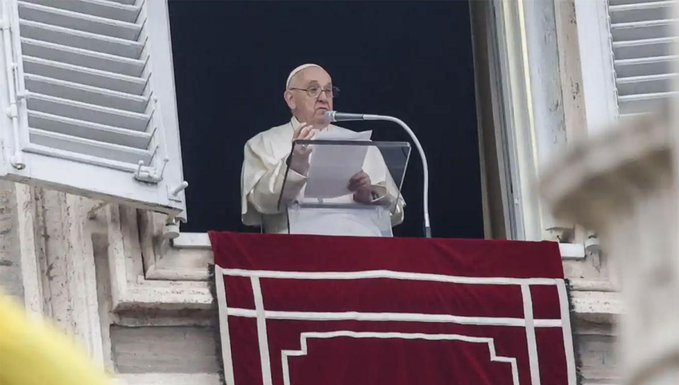 Pope Francis today expressed his regret over a likely escalation of the conflict in the Middle East, due to Iran’s recent military response to Israel’s April 1 attack on its consulate in Damascus, Syria.
Pope Francis today expressed his regret over a likely escalation of the conflict in the Middle East, due to Iran’s recent military response to Israel’s April 1 attack on its consulate in Damascus, Syria.At noon this Sunday, after reciting the Regina Caeli from the window of his study in the Vatican Apostolic Palace before approximately 15,000 faithful and pilgrims at St. Peter’s Square, the Supreme Pontiff expressed that “no one should threaten the existence of others”.
The Bishop of Rome said that he follows “with concern, even with pain” the news of the last hours about a worsening of the situation due to the Iranian military action with the launching of about 200 drones and missiles against Israel, an action expected after the provocation of Tel Aviv, by destroying the consulate of Tehran in Damascus.
The Israeli bombing killed 11 people, among them seven members of the Islamic Revolutionary Guard Corps (IRGC), including General Mohammed Reza Zahedi, who was one of Iran’s most important military commanders.
The pontiff called for a halt to any action that “could fuel a spiral of violence with the risk of dragging the Middle East, where as a result of the Israeli-Palestinian war more than 34,000 people have already died in Zionist attacks on the Gaza Strip, into an even greater conflict.
“Let all nations defend peace,” said the Pope, who again pointed to the recognition of “two States, side by side, under conditions of security” as a way to solve the Israeli-Palestinian dispute.
Francis asked that “we soon reach a cease-fire in Gaza and follow the paths of negotiation with determination”, while he referred to the need for the release of the Israeli hostages kidnapped since October last year and demanded help for the people of Gaza who have fallen into a humanitarian catastrophe.
“How much suffering! We pray for peace, no more war, no more attacks, no more violence! Yes to talks and yes to peace!”, Pope Francis finally stressed.
At 16:00 local time today, a meeting of the leaders of the countries that make up the Group of Seven (G7) began in Rome, coordinated by Giorgia Meloni, Prime Minister of Italy, the country that currently presides over this bloc, which is also made up of the United States, France, Germany, Japan, Canada and the United Kingdom.
In a communiqué published on the official website of the Presidency of the Council of Ministers of this European nation, it is specified that in the debate between the G7 leaders by videoconference, actions against Iran will be evaluated after the recent retaliatory attack against Israel.
Edited by Liubis Balart